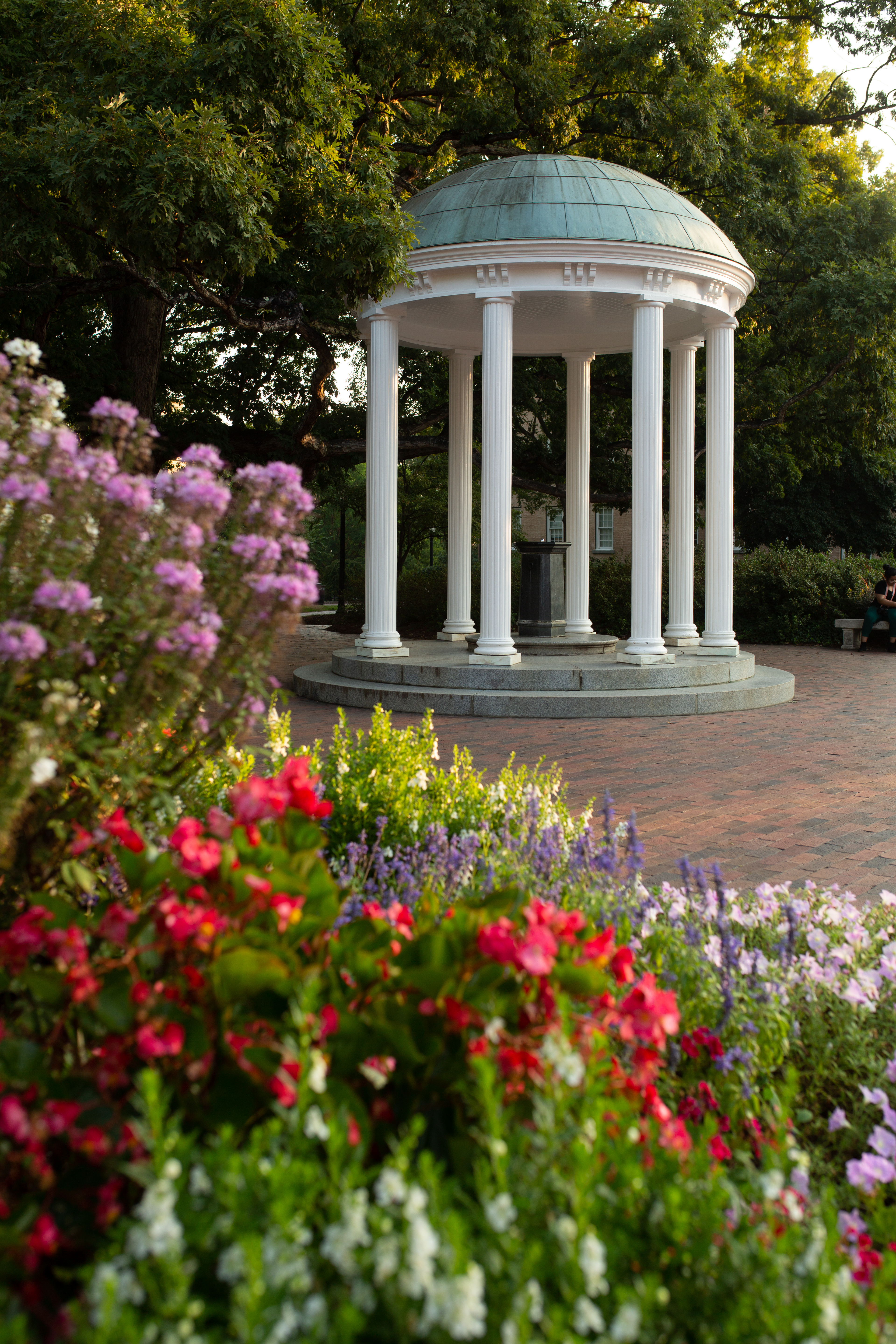UNC Neurosurgery Residency Program
Why UNC?
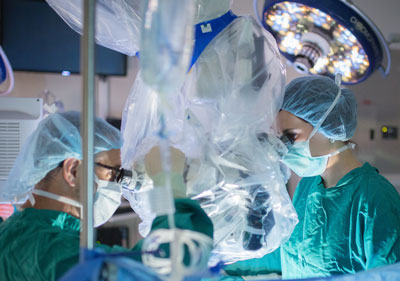 Dear Residency Candidate,
Dear Residency Candidate,
We welcome your interest in our program and hope that you enjoyed your visit with us last fall. As you begin ranking your preferred programs this month, we hope that UNC will be high on your list.
As our illustrious alumni can attest, UNC Neurosurgery has much to offer. A few highlights include:
- An approachable, energetic faculty who create a collegial and supportive environment where residents can learn and thrive.
- Case distribution across neurosurgical subspecialties.
- “Ownership” of your residency program – Residency curriculum, duty hour monitoring, continued accreditation process.
- A large and diverse population of patients who are members of the second largest health care system in North Carolina.
- A strongly collaborative, multidisciplinary approach to patient care that includes close relationships with Lineberger Comprehensive Cancer Center, Sheps Center for Health Services Research, UNC Gene Therapy Center, and others.
A brief review of our program is provided below. Please don’t hesitate to reach out to us if you have additional questions. Our contact information is at the bottom of this page.
Wishing you great success in this exciting new chapter of your life!
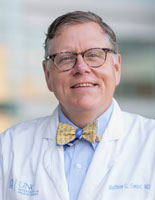 |
Matthew Ewend, MD, FACS Department Chair |
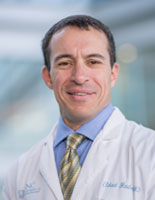 |
Eldad Hadar, MD Program Director |
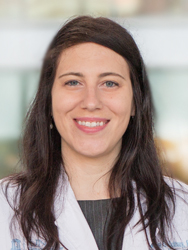 |
Carolyn Quinsey, MD Associate Program Director |
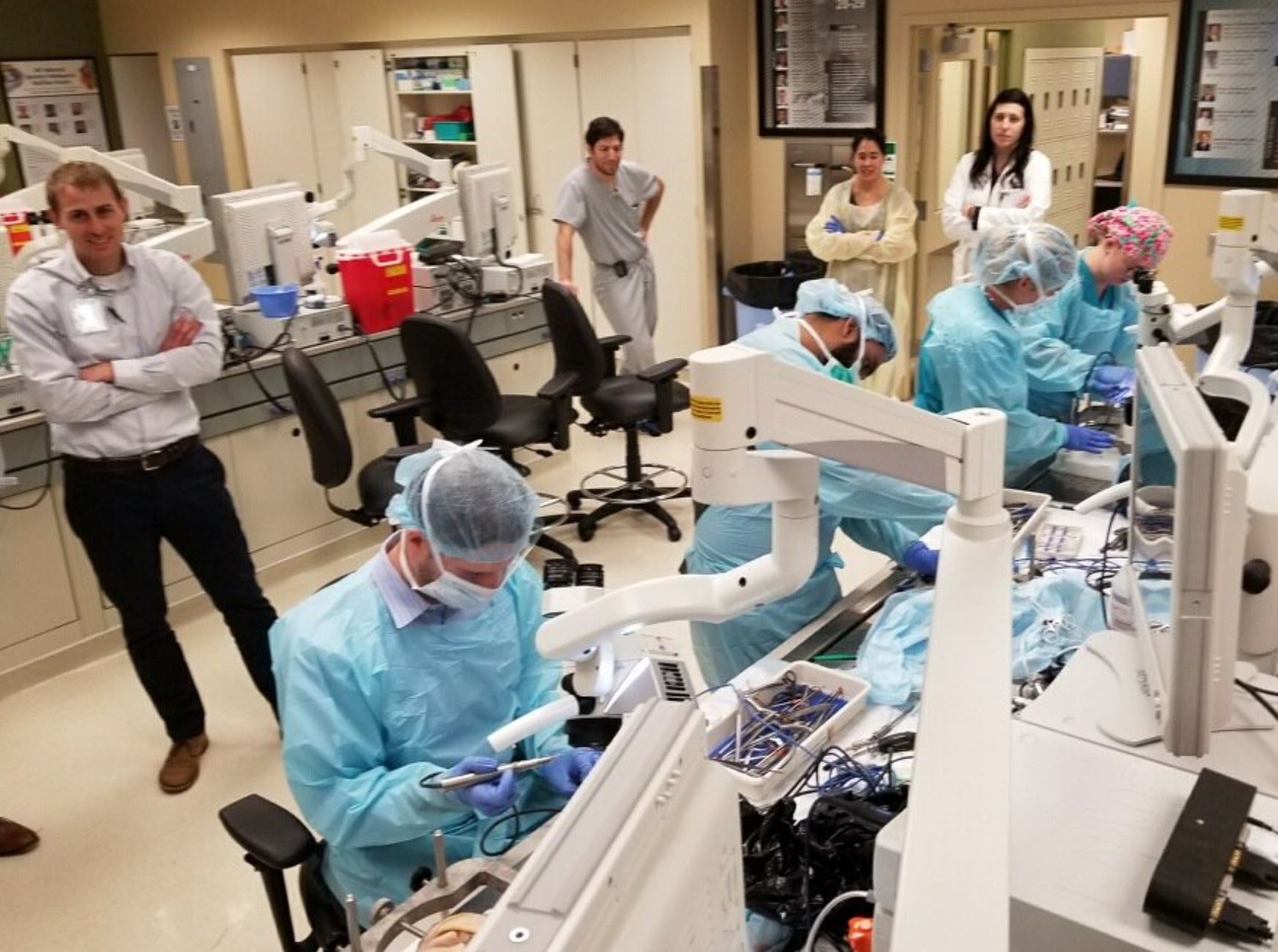
- Neurosurgery resident education is the fundamental unifying goal of the department, and our faculty are each committed to individual, apprentice-style teaching. Six different faculty have won the resident teaching award in past eight years, showing broad commitment among faculty.
- Residents are empowered to help define their program including rotations, case selection, conference and educational content, as well as deep participation in future resident selection.
- Our department believes every finishing resident, in additional to technical skills and a solid knowledge base, must possess a careful understanding of how health care systems function, how quality improvement is made, and how physicians are effective advocates for their patients and their practice within the system.

- Neuroscience ICU: 16 beds expanding to 22
- Neurocritical care service – 24/7 coverage by NP’s and attending
- Three months in PGY-1, 6 weeks in PGY- 4
- UNC Spine and Imaging Center
- UNC Skull Base Skills Lab – Weekly
- Anatomy quiz, lecture or case discussion, cadaver dissection, other activities
- Radiosurgery – CyberKnife Center, Cranial and Spinal, 118 cases last year, resident rotation
- UNC Hillsborough Campus
- Mission Hospital in Asheville, NC – 763 beds
- Carolina Spine and Neurosurgery Center – About 75% spine
- 2,932 cases in 2016, 6 months during PGY-6 year
- UNC Project Malawi – Every resident has an opportunity to visit
- New surgery tower under construction
- UNC is a public, global, heavily funded research university
- First public university in US
- Top five public universities (US News)
- Top six in federal research grant expenditures
- Two Nobel laureates – medicine and chemistry
- Strongly collaborative, center-based

- 12 Residents
- 17% female (13% nationwide)
- 6 married (none divorced) / 4 engaged
- 3 have children
- 8 homeowners / 4 renters
Medical schools:
- UNC (3)
- Rutgers Medical School (2)
- Ohio State University
- Eastern Virginia Medical School
- Georgetown University
- Quinnipiac University
- University of Michigan
- University of Kentucky
- Wake Forest University
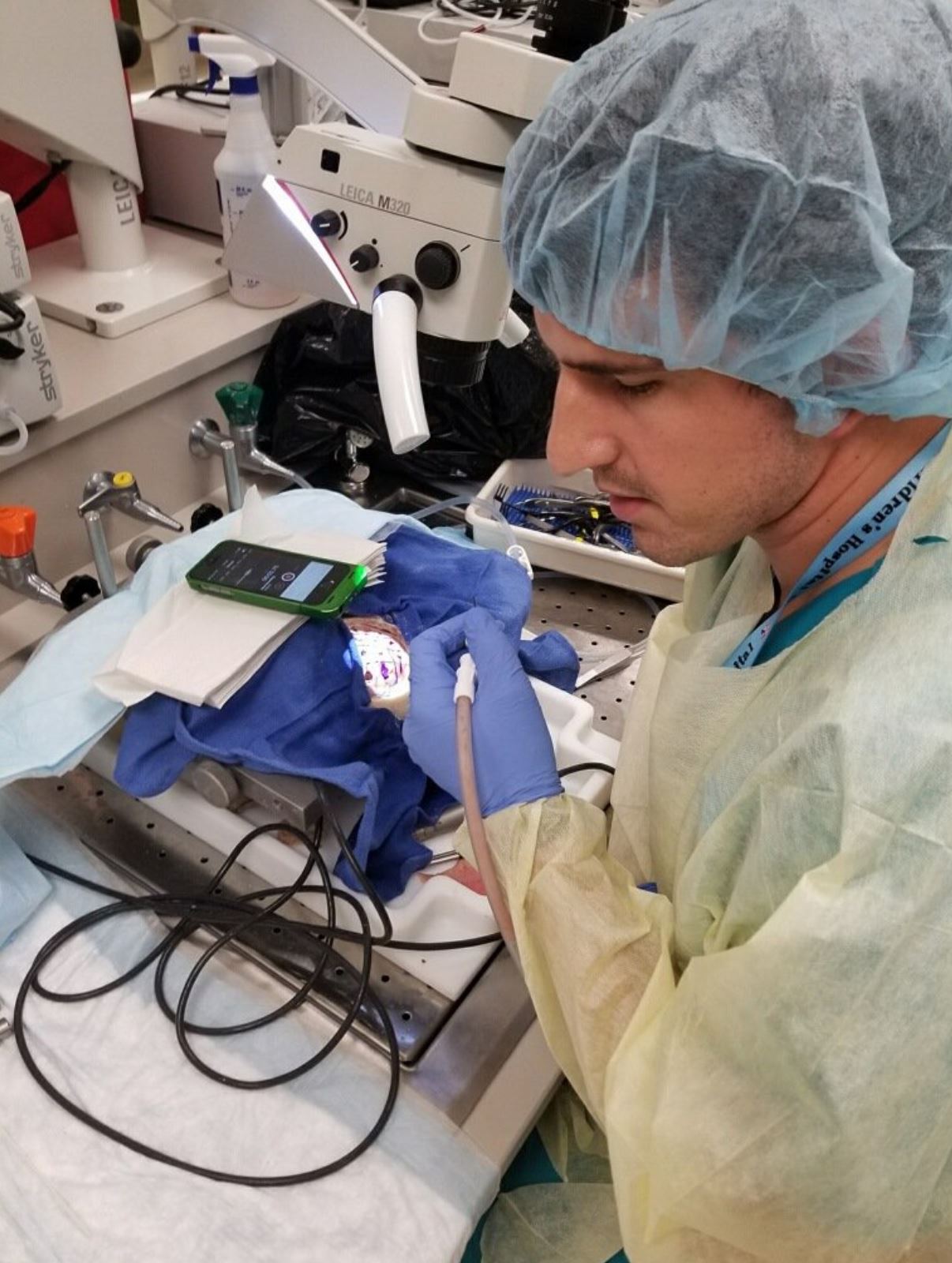
Matt Ewend, MD, FACS
- Induced neural stem cells for treatment of GBM and other cancers
- Partner: Shawn Hingtgen, UNC School of Pharmacy, Falcon Therapeutics
- NFL Injury Advisory Board
Deb Bhowmick, MD
- Comparative mortality in elderly patients with axis fractures with Dr. Michael Catalino, resident
- Partner: Til Sturmer, Chair of Epidemiology, UNC Gillings School of Global Public Health, Sheps Center for Health Services Research
Carolyn Quinsey, MD
- Simulation to improve resident technical skills in flexible endoscopy, aneurysm surgery, microdissection techniques
- Global TBI and hydrocephalus treatment
Deanna Sasaki-Adams, MD
- Role of inflammation in brain aneurysm development
- Minimally invasive clot resection for spontaneous intracerebral hemorrhage
Kevin Carneiro, MD
- Sports related concussions
- NFL Players Association post-career (“The Trust”), UNC Center for Retired Athletes
Academics and Research
- Every resident is expected to have an ongoing academic project and submit one abstract/paper per year.
- Resident education fund supports travel to meetings to present work, and funds research costs.
- Department has more than $700K in funds to support start-up research and a $4.6M gift for the Weatherspoon Brain Tumor Program.
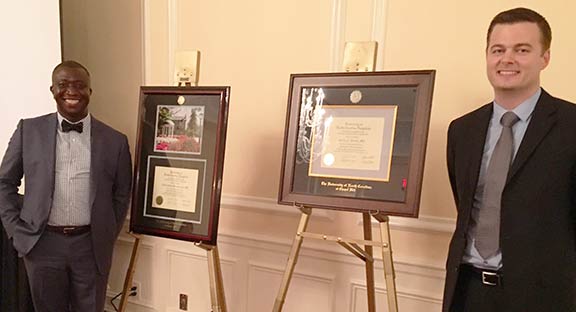
Endovascular Fellowships
- University of Wisconsin
- University of Illinois, Chicago
(now in private practice)
Spine Fellowships
- Texas Back Institute
- University of Wisconsin
- Cleveland Clinic (now Cedars-Sinai faculty)
- Duke Medical Center (now in private practice)
Pediatric Neurosurgery Fellowships
- Oregon Health & Science University
(now UNC faculty) - University of Pittsburgh
(now University of Florida faculty)
Private Practice
- Johnson City, TN
- Asheville, NC
- Arkansas
Skull Base Fellowship
- St. Louis University (now UNC faculty)
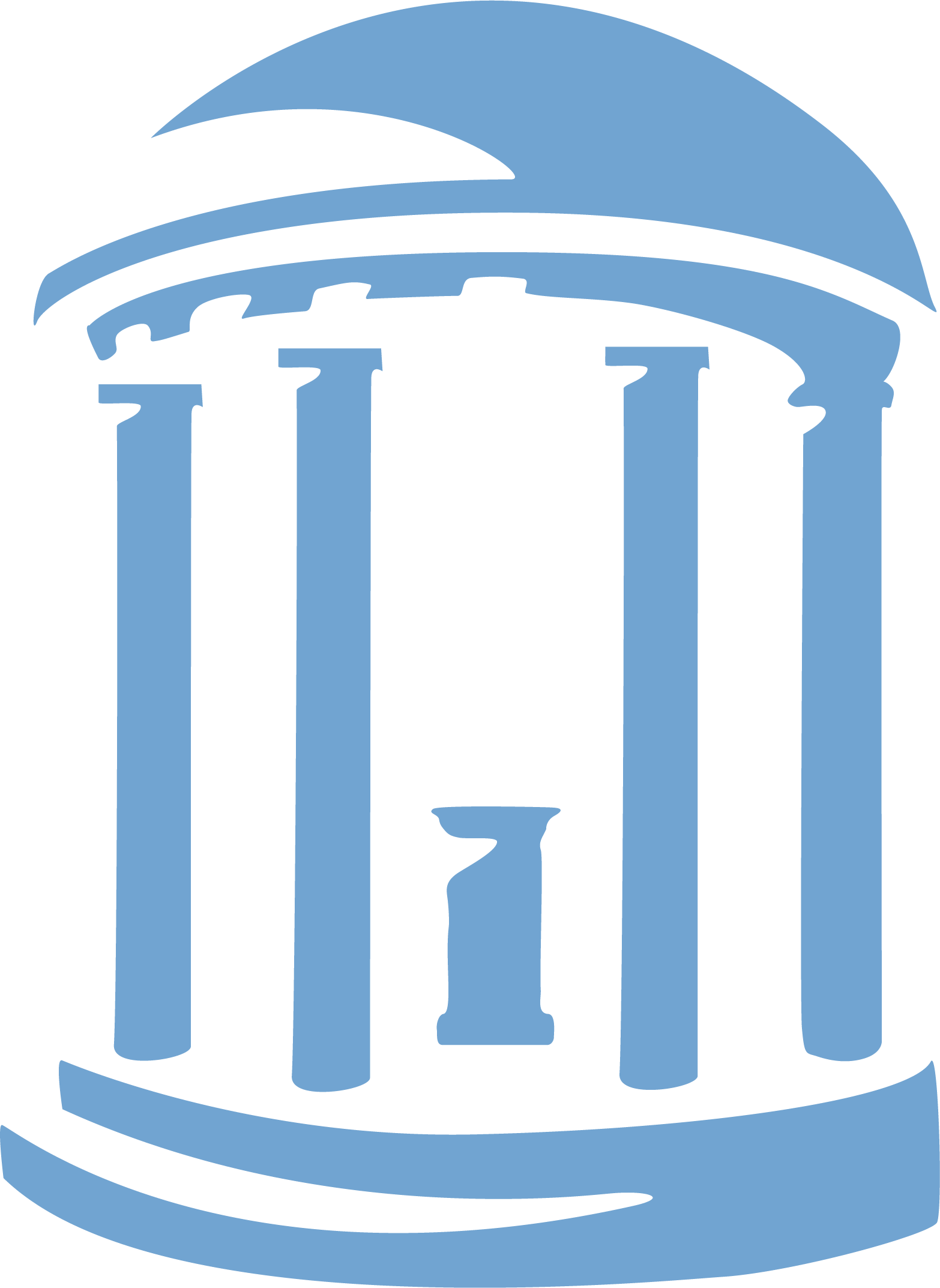
- Resident Education Fund
- Any needed educational material
- Step 3 during PGY-1 year (about $800)
- ABNS written exam
- Loupes and headlights
- Meal allocation
- Sponsored travel to any meeting with an oral presentation
- Conferences
- PGY-1 boot camp
- Junior resident boot camp
- RUNN Course
- Cleveland Spine Review
- CNS 3-D Anatomy Course
- UNC Skull Base/Endoscopy Course
- SLU Skull Base/Endoscopy Course
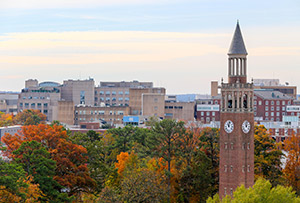
The Town of Chapel Hill is one point of the “Triangle Area” which also includes Raleigh and Durham. The community has been ranked as one of the best places to live in US with its excellent public schools, strong economy, quality health care, and many amenities.
Chapel Hill is a friendly, exciting, academic community. The resources of the area are comparable to those of a much larger metropolitan community and include a variety of exceptional restaurants and many cultural offerings. And few can escape the excitement of NCAA sports with UNC Athletics.
The mild climate with four distinct seasons and many sunny days provides numerous recreational choices. Joggers and bikers are ever present on the streets, greenways and trails.
Only a few hours to the west, the North Carolina Mountains offer many opportunities for hiking and camping. Even closer, east of the Triangle, North Carolina offers some of the most beautiful beaches on the entire eastern seaboard.


Contact Us
Please feel free to contact our faculty with any questions. Julie Seger, our program coordinator, will help you connect with them. Thank you!
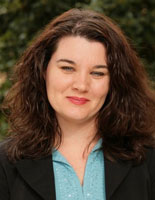 |
Julie Seger Program Coordinator julie_seger@med.unc.edu (919) 445-0627 |
